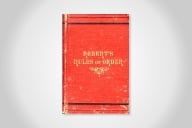You have /5 articles left.
Sign up for a free account or log in.
In a recent issue of The New Yorker (February 14/21), Rebecca Mead, in an essay called “Middlemarch and Me,” describes her efforts to track down the origin of a saying attributed to George Eliot: “It is never too late to be what you might have been.” Mead first encountered the quotation on a refrigerator magnet, “set in sans-serif type on an aquamarine starburst background.” But, Mead writes, “the sentence didn’t sound to me like anything George Eliot would say.” Uh oh, I thought to myself. This is going to end badly. Not only will the quote certainly prove a fake but also Mead is going to be bewildered by the discovery. No professional action will be taken.
Every academic by now knows the routine. You come across a pithy quote by a famous author that doesn’t sound quite right. No source text is given. A general web search yields ten pages of links to self-help sites or quote-a-day webpages. A Google Books or Google Scholar search will offer links to published self-help books or articles going back to the 1980s. None of the sites will offer a full citation or even gesture toward a source text. You sadly conclude that the quote is bogus. Such is academic life in the age of the search engine.
My own moment of dismay came when the president of the small Southern liberal arts college where I was first teaching -- my first job after receiving my Ph.D -- used a suspicious quote in an email sent to all faculty. “ ‘The only real voyage of discovery consists not in seeking new landscapes, but in having new eyes' -- Proust.” A quick Google search offered the usual inspirational webpages, all featuring the quote as a snippet of wisdom, not literature. However, I had the 1929 C. K. Scott Moncrieff translation of Marcel Proust’s Remembrance of Things Past on a shelf near my computer and I turned to Volume 5, Chapter 2, “The Verdurins Quarrel with M. De Charlus.” There was the passage in the context of the narrator’s long reverie on the profundity of a musical work by a composer named Vinteuil: “The only true voyage of discovery, the only fountain of Eternal Youth, would be not to visit strange lands but to possess other eyes, to behold the universe through the eyes of another, of a hundred others, to behold the hundred universes that each of them beholds, that each of them is; and this we can contrive with an Elstir, with a Vinteuil; with men like these we do really fly from star to star.” The college president’s quote was but a small fragment torn inappropriately from a broad and complex tapestry. What should I do?
I know that I’m overly scrupulous. I’m the sort of professor who insists that “Shakespeare” did not say “To thine own self be true,” but that Polonius did in Act 1, Scene 3 of William Shakespeare’s The Tragedy of Hamlet, Prince of Denmark (~1603). I regularly fail students who do not cite sources fully and properly in their papers. I send them to the library catalog (the road not taken) or to Wikipedia to find the proper source. If it isn’t there, I tell them to put it there. If everyone can be an editor, Wikipedia is more a blessing than a curse.
Take the case of a Gilbert K. Chesterton quote that I first encountered as the epigraph on a clever student’s final paper: “Anything worth doing is worth doing badly.” I suspected that Chesterton didn’t say exactly that, despite the 40,000+ Google hits that say that he did. Naturally, none of the websites provide a source text. The quote sometimes appears as “A thing worth doing is worth doing badly” but the results are the same. Like “it is never too late to be what you might have been,” the “worth doing badly” saying has a kind of catchy truthiness. It circulates as wisdom, untethered to context.
After a ten-minute search I found that G.K. Chesterton actually wrote this: “These things [by which he means ‘writing one’s own love letters or blowing one’s own nose’] we want a man to do for himself, even if he does them badly” (Orthodoxy, 1908). Chesterton’s point here is not that things worth doing are worth doing badly but that some things one must do oneself, however badly they are done. “Blow your own damn nose” would be a pretty good paraphrase and might even work as a refrigerator magnet.
And yet, in a more obscure essay called “Folly and Female Education,” which appears as Chapter 41 in What’s Wrong With the World (1910), available on Google Books, I found, hours later, that Chesterton indeed wrote something similar to what my student quoted: “if a thing is worth doing, it is worth doing badly.” Chesterton’s context is the folly (as he puts it) of educating women. Women, he argues, should be taught nothing in order to be capable of doing things only for love, not for profit or (the horror!) scientific or academic inquiry. Once again I found that the popular saying was a misconstrued fragment torn from (in this case) a rather disturbing and patronizing context. Apparently if a thing is worth quoting, it is worth quoting badly.
Flipping through the pages of Rebecca Mead’s article, I found myself irritated by her earnest tone as she searched for the quote in dusty old George Eliot compilations and among tenured academics. With a presumably straight face one scholar says, “It doesn’t sound like George Eliot to me -- too simplistically phrased and too pat, and too brief!” A Harvard professor tells Mead that she assumes the saying was “apocryphal,” a more sophisticated term than counterfeit. Mead intrepidly calls up a self-help author who used the quote in the title of her book who admits -- surprise! -- that she has never read George Eliot since Silas Marner in high school. Chesterton, I imagine, would approve of the circulation of a colorful but inaccurate or decontextualized Eliot quotation in women’s self-help books and refrigerator doors because of the uplifting “truth” it contains. I don’t.
Does Mead, a seasoned New Yorker writer, really not suspect the obvious, that in the age of mechanical and digital reproduction, fake quotes flourish? That their circulation requires not bewilderment but professional vigilance? In her initial hunting, Mead had already discovered the ersatz Eliot in spiritual books and self-help websites. Only one scholar interviewed by Mead stated what clearly should be obvious: that the source of a saying was most likely a greeting card company. Mead concludes, dolefully, that she “had aspired to make a link in the chain of discovery, and had failed.” Why not use her authority to do the rest of us a favor and call the fake a fake, once and for all? We could then list it on the handy Wikipedia page “list of misquotations.” Instead Mead wrings her hands.
My first teaching job in the South was not a good fit for many reasons, including my irritation with the fake-quote-spouting President. She had risen to the position via the route of student affairs, not teaching; her time in office had been marked by a relative indifference to academics and scholarship. One April morning during my last semester there (a job offer from my current university safely in hand), she sent an e-mail to the entire faculty with the following quote: “ ‘It is not the strongest species that will survive, nor the most intelligent, but the ones most responsive to change.’ -- Charles Darwin.” In a prickly mood, I decided to hit “reply all” and call her on it. “Greetings,” I wrote, and then the following:
The real question is who really said this? It wasn’t Darwin. This quote is often (wrongly) attributed to him but Darwin was never so pithy. I’ve read most of what Darwin wrote (including his letters) but it isn’t there. In fact, there is a rather vibrant debate among Darwinists and social Darwinists about who first wrote that quote; some say it was Herbert Spencer who wanted to make Darwin sound “easy.” This debate gets swallowed up by the number of Managerial Quote websites that continue to peddle the quote without proper attribution. As a professor, I’m sure you agree that we need to teach our students to cite sources correctly. Attribution is the lifeblood of scholarship.
Pardon the pedantry, but this is precisely what my job description as a literature professor requires that I do in response to disembodied quotes without proper citations.
Yours truly,
Hollis
I would not advise young professors to try this at home. But, as I added in a follow-up e-mail, “T.S. Eliot wrote (in his essay 'Tradition and the Individual Talent,' The Sacred Wood: Essays on Poetry and Tradition [1922]): 'Some one (sic) said: "The dead writers are remote from us because we know so much more than they did." Precisely, and they are that which we know.' ”
With so many texts online, it may be easier than ever for amateur misquotations to breed, but it is just as easy for professionals to set the record straight. In other words, Rebecca Mead, “It is never too late to be the Wikipedia editor that you might have been.”








